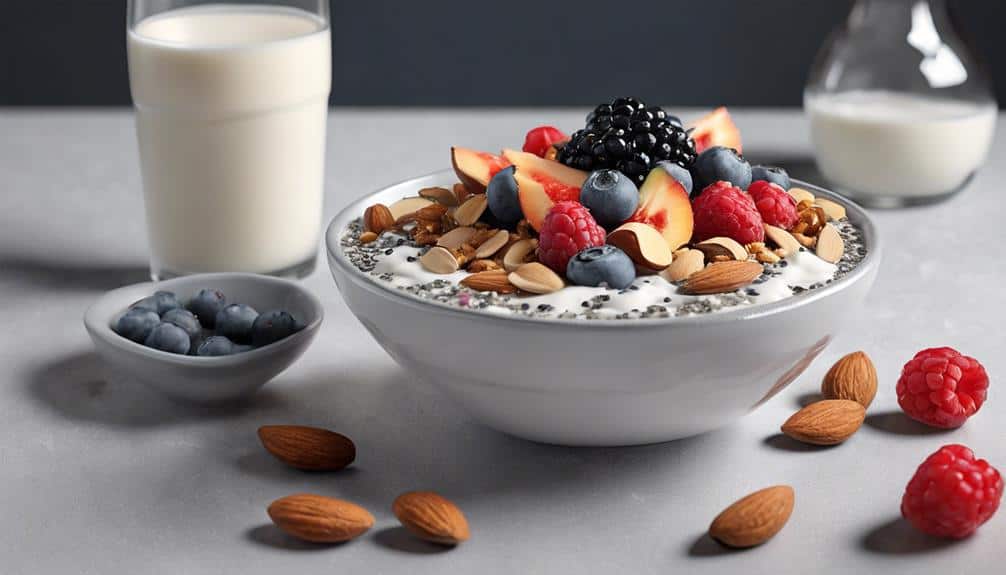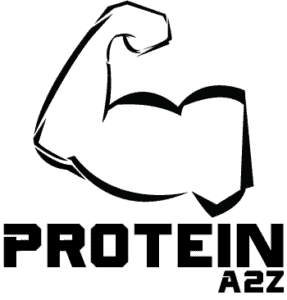Open the door to enhanced energy, cognitive function, and well-being by unraveling the mysteries behind a 30g protein breakfast - find out
Starting your day with a 30g protein-packed breakfast can set the stage for a myriad of health benefits. Have you ever wondered why this macronutrient is crucial in the morning meal? The impact of protein consumption at breakfast extends beyond just feeling full. It can significantly influence your entire day's energy levels and cognitive function.
By understanding the 'why' and exploring the 'what' of a 30g protein breakfast, you'll discover a wealth of information that could transform your mornings for the better.
Table of Contents
Importance of Protein in Breakfast

Protein in your breakfast plays a crucial role in regulating blood sugar levels and enhancing your focus throughout the day. It's essential for weight management, as including protein in your morning meal can aid in weight loss by preserving muscle mass and reducing body fat.
Not only does consuming protein in the morning support weight loss, but it also contributes to increased energy levels and alertness. Dieters who incorporate higher amounts of protein into their breakfast tend to burn more calories and fat compared to those following standard diets.
Moreover, protein at breakfast is vital for muscle strength, repair, hormone production, and blood sugar control. By starting your day with a protein-rich breakfast, you set yourself up for success in terms of maintaining muscle mass, managing weight, and sustaining energy levels throughout the day.
Benefits of a 30g Protein Breakfast
Starting your day with a 30g protein breakfast can boost your metabolism and help you feel fuller longer, aiding in weight management and reducing cravings. Here are some benefits of incorporating a high protein breakfast into your morning routine:
- Consuming 30g of protein in the morning can help burn more calories throughout the day.
- This breakfast choice reduces appetite and food intake at lunchtime, supporting weight management.
- Opting for a 30g protein breakfast can decrease cravings for carbohydrates, assisting in maintaining a balanced diet.
- High protein breakfasts play a role in improving gut health, promoting a healthy digestive system.
- Ensuring muscle maintenance is crucial, especially during weight training, making a 30g protein breakfast an excellent choice to support muscle growth and recovery.
Protein Sources for Breakfast

After understanding the benefits of incorporating a 30g protein breakfast into your routine, exploring various protein sources for breakfast can enhance your meal options and nutritional intake.
Eggs are a versatile choice, offering about 6 grams of protein per medium egg along with essential nutrients. Greek yogurt and cottage cheese, with 11-16 grams of protein per serving, are excellent protein-rich dairy options.
Meat and fish like bacon, sausage patties, salmon, and plant-based alternatives are also great sources of protein for breakfast. If you prefer plant-based options, beans, lentils, and chickpeas are high-protein choices suitable for vegetarian or vegan diets.
Nuts and seeds, such as almonds providing 6g of protein and peanuts with 7g of protein, can be added to your breakfast for plant-based protein. Including these protein sources in your breakfast can help you create delicious and high-protein breakfast options to start your day right.
Impact of Protein on Energy Levels
Boosting your energy levels throughout the day can be influenced by the impact of incorporating protein into your breakfast routine. When you prioritize protein intake in the morning, you're setting the stage for a day filled with consistent energy and vitality. Here's how protein can positively impact your energy levels:
- Stable Blood Sugar: Protein at breakfast helps stabilize blood sugar levels, preventing energy crashes.
- Boosted Metabolism: Adequate protein intake boosts metabolism, enhancing energy production.
- Sustained Energy: Consuming protein-rich breakfasts aids in maintaining consistent energy levels and mental focus.
- Muscle Health: Protein supports muscle health, contributing to long-lasting energy and vitality.
- Prevention of Hunger Pangs: Including protein in breakfast can prevent hunger pangs, providing sustained energy for daily activities.
Recipes for a 30g Protein Breakfast

When aiming for a 30g protein breakfast, consider trying out these delicious and nutritious recipes to kickstart your day with a protein-packed meal. Here are some high-protein breakfast ideas using various protein sources:
| Recipes | Protein Sources |
|---|---|
| Eggs with Nut Butter Toast | Eggs, Nut Butter |
| Greek Yogurt with Berries | Greek Yogurt, Seeds |
| Oatmeal with Egg Whites | Egg Whites |
| Protein Smoothie | Protein Powder, Nut Butter |
These recipes offer a balanced mix of protein-rich ingredients like eggs, Greek yogurt, seeds, and protein powder to help you meet the 30g protein breakfast goal. Try incorporating cottage cheese, nuts, or seeds into your breakfast meals for added variety and nutrients. Experiment with different combinations to find what suits your taste buds and provides the energy you need to start your day right. High-protein breakfast options not only support your health goals but also keep you feeling full and satisfied until your next meal.
Tips for Incorporating Protein in Breakfast
To enhance the protein content of your breakfast, consider incorporating protein-rich foods such as eggs, Greek yogurt, nut butter, or protein powder into your morning meal. Here are some tips to help you boost the protein content of your breakfast:
- Opt for high-protein grains like quinoa to add a substantial amount of protein to your meal.
- Experiment with plant-based protein sources such as tofu for a meatless protein option.
- Combine protein sources with fiber-rich fruits for a well-rounded and nutritious breakfast.
- Be mindful of portion sizes to ensure you're getting an adequate amount of protein while maintaining balance.
- Consider adding nut butter to your breakfast for a delicious and protein-packed spread.
Frequently Asked Questions
Why Should You Eat Protein for Breakfast?
Eating protein for breakfast helps regulate blood sugar levels, boosts metabolism, and promotes satiety. It supports muscle repair and growth, enhancing cognitive function and energy levels.
Consuming protein in the morning aids in weight management and calorie burning while keeping you full for longer. So, including protein-rich foods in your breakfast routine is a smart choice for overall health and wellness.
What Is High-Protein Breakfast Used For?
High-protein breakfasts are essential for boosting metabolism, controlling blood sugar levels, and aiding in weight management. They provide crucial amino acids necessary for muscle health, repair, and growth. By consuming a high-protein breakfast, you can reduce your appetite, resulting in lower calorie intake throughout the day.
Opting for protein-rich breakfast options will help you feel fuller and more satisfied after meals, supporting your energy levels, cognitive function, and overall health.
What Does a 30 G Protein Breakfast Look Like?
A 30g protein breakfast typically includes:
- Eggs
- Greek yogurt
- Nut butter
- Protein-rich smoothies
Combining sources like yogurt, cottage cheese, seeds, and eggs can help you reach the 30g protein goal.
Including protein sources like beans, lentils, and whole grains can enhance the protein content of your breakfast.
You can also add protein powder, egg whites, or collagen supplements to oatmeal for a high-protein breakfast that promotes satiety and supports muscle health.
What Does a 40 Gram Protein Breakfast Look Like?
For a 40 gram protein breakfast, mix it up with eggs, Greek yogurt, lean meats, nuts, seeds, and protein-rich smoothies. This combo helps with muscle repair, keeps you full, and aids in weight management. Try dairy, poultry, and plant-based options for variety.
Cottage cheese, quinoa, chia seeds, and protein bars are also good picks to hit that 40 gram protein goal. Planning a balanced breakfast sets you up for a healthy day.

